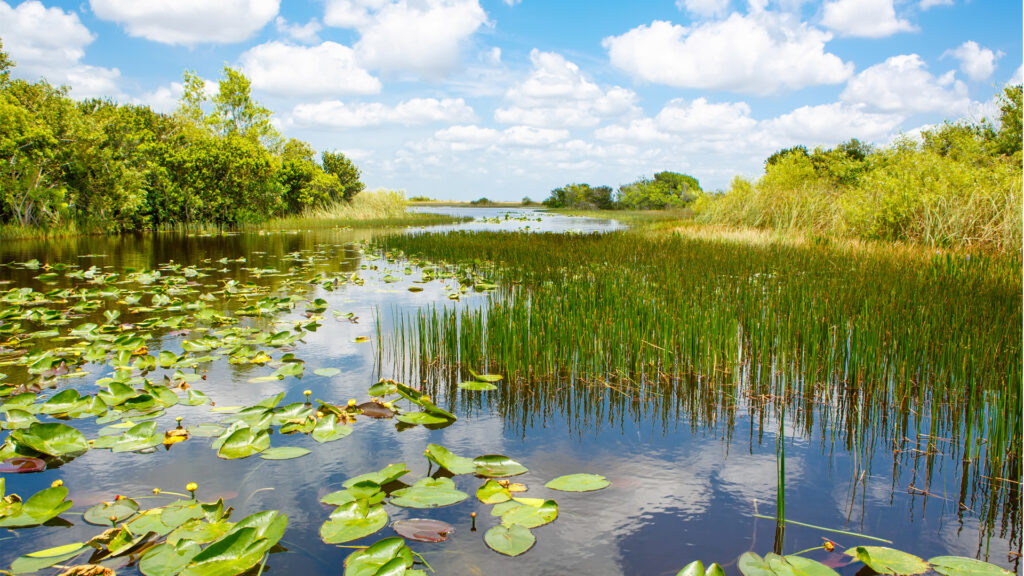By Bridget Coughlin, Shedd Aquarium
When discussions around aquatic conservation arise, our minds often drift to vast oceans, picturing graceful sea turtles, stunning reef sharks and vibrant yet fragile marine life.
However, we must recognize the equal importance of freshwater environments. These ecosystems serve as key pillars in the fight against climate change while providing essential services to humans.
Freshwater habitats are indispensable lifelines, supporting a rich tapestry of biodiversity, including 50% of all known fish species.
Alarmingly, we are losing these vital environments at three times the rate of terrestrial spaces. The United Nations estimates one-third of the world’s wetlands have been destroyed since 1970, plunging biodiversity and threatening food and water shortages. Moreover, the Supreme Court rolled back the longstanding 1972 Clean Water Act last year.
Home to an extraordinary collection of species, such as the West Indian manatee, the Everglade snail kite and the Nassau grouper, Florida Everglades National Park is surrounded on three sides by rising seas, making it a target for the impacts of a warming climate.

Throughout the biodiverse treasure of the Everglades, sawgrass marshes, cypress swamps and ponds exist, creating critical homes for plant and animal life — including 39 endangered and threatened species. But year-round natural threats damage freshwater areas — from hurricanes, floods and droughts to man-made destruction like pollution, urban sprawl and drainage.
The value of these biodiverse landscapes cannot be overstated. A single acre of wetlands in the Everglades can absorb upwards of 1.5 million gallons of stormwater, protecting surrounding areas from flooding and retaining water during droughts.
Rivers act as natural carbon sequesters and conveyors, depositing bio-rich sediment into our oceans and keeping carbon out of our atmosphere. The Biscayne Aquifer consists of highly permeable limestone rock and delivers fresh drinking water to South Florida residents. It lies at shallow depths, making it prone to saltwater intrusion. Rising sea levels cause saltwater to infiltrate aquifers and canals, pushing freshwater further inland and reducing the available supply for us to drink.
Water purification does not just happen at the Miami-Dade water treatment plant. It is an ancient environmental service provided by wetlands’ natural filtration processes and we depend on it for safe drinking water.
As we grapple with the consequences of our consumption-driven deterioration of freshwater habitats, addressing the impacts of climate change becomes paramount.
By partnering and pooling our resources to rebuild resilient freshwater ecosystems, we are investing in combating climate change and securing a healthy planet for generations of animals and humans alike.
These investments can manifest as global commitments like pledging to protect 30% of the world’s aquatic and terrestrial ecosystems by 2030 — an ambitious goal supported by the America the Beautiful initiative in the U.S.
They also show up as local initiatives like the 80-foot research vessel R/V Coral Reef II, a floating field station operated by Shedd Aquarium, where open-water studies and conservation efforts have taken place for decades. The vessel is currently docked in the Miami River, studying the impact of overheating on coral.
Collectively, we can prioritize changing water flow delivery and management, increasing water quality standards and investing in restoration projects to mitigate the effects of damage on freshwater environments.
The water cycle is a closed system — all the water that will ever exist on our planet is already here. We cannot replenish it. Instead, we must work together to ensure its survival — what many already call the “water economy.” Indeed, while we live on a blue planet covered 70% by water, only 1% of this is fresh.
This is a message I shared with my co-presenters at the recent Aspen Ideas: Climate conference in Miami. Freshwater matters in multiple dimensions.
It is up to each of us to appreciate the priceless value of our freshwater spaces. Protecting coastal wetlands is an opportunity — an obligation — that sets us on a path to a more resilient blue future.
Bridget Coughlin is president and CEO of the Chicago-based Shedd Aquarium, the third largest aquarium in the Western Hemisphere. Coughlin has a PhD in biochemistry. This opinion piece was originally published by the Miami Herald, which is a media partner of The Invading Sea.
If you are interested in submitting an opinion piece to The Invading Sea, email Editor Nathan Crabbe at ncrabbe@fau.edu. Sign up for The Invading Sea newsletter by visiting here.



